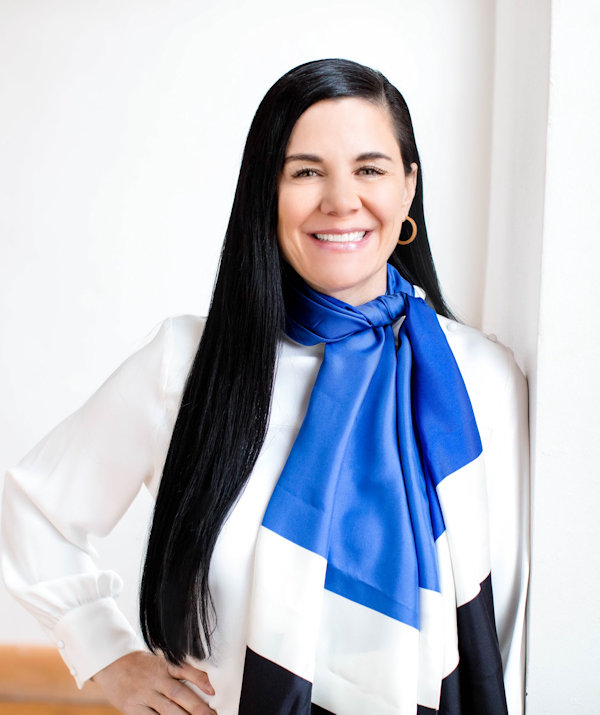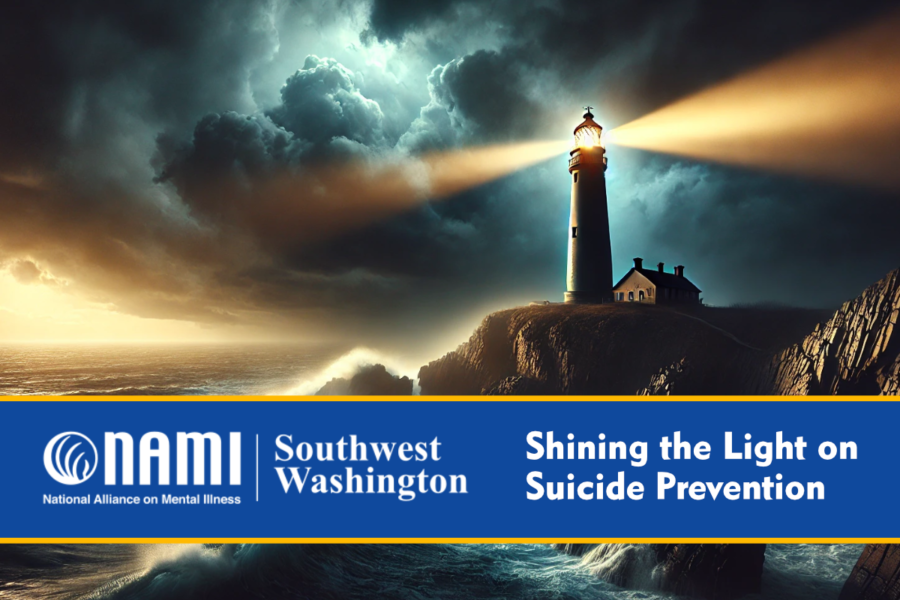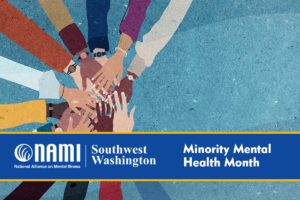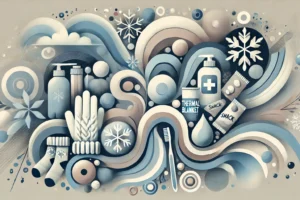On September 14th, from 4:00 to 7:00 pm, NAMI Southwest Washington will, at the Clark County Family YMCA, will host the Shine the Light Suicide Prevention and Awareness Summit. This event is not just another gathering; it’s a beacon of hope, a place where we come together as a community to address one of the most serious issues of our time. It’s about raising awareness, educating the public, and fostering a community where we feel empowered to discuss suicide, its causes, and its prevention. As we enter National Suicide Prevention Month, this summit is an opportunity to increase our understanding of suicide, its prevalence, the risk factors, and to gain access to tools that can help save lives.
During the event, we will have 2 decompression rooms, the presence of local chaplains in plain attire, providing non-religious comfort, and community resource tables through our MANY partners. There will also be resources specific to faith communities and the construction industry as well as info on NAMI programs. A musical performance and an assortment of snacks and beverages will be thoughtfully provided by the YMCA!

It is with great pleasure and anticipation that we introduce our esteemed guest speaker for the upcoming Shine the Light Suicide Prevention and Awareness Summit – Sonja Wasden. Sonja, a suicide survivor with 30+ years’ of lived mental health experience, is an award-winning author, passionate mental health advocate, and inspirational mental health speaker.
Her award-winning and best-selling book, An Impossible Life, which details her struggles with mental illness. She has spoken across the nation with Fortune 500 firms, nonprofits, government bodies, advocacy groups, and media outlets, about the importance of addressing mental health. Oprah Winfrey participated in one of her mental health advocacy book clubs at the world’s largest women’s prison, Central California Women’s Facility. Sonja is dedicated to creating open, inclusive, and educational conversations around mental health.
A Personal Story
Growing up, I always knew I wanted to join the Army. My father’s stories of his time in the Army before and during the Vietnam War filled me with respect and admiration. He was wise, worldly, and strong, and I wanted to be just like him in that way. I tried college for a year, but the pull of the experience of the military was too strong. At 19, I enlisted as an infantryman, eager for the excitement and the new experiences that awaited me.
Basic training was nothing like I imagined it would be. I went in thinking I knew what to expect—physical challenges, long days, discipline. But nothing could have prepared me for the reality of those weeks. The physical exhaustion was relentless, but it was the emotional strain that really got to me. There were days when I was so tired, so completely worn down, that I wasn’t sure I’d make it through. The constant pressure to perform, the never-ending drills, the lack of sleep—it all pushed us to our absolute limits. In the midst of that intensity, I met Anthony. He was assigned as my battle buddy, and we quickly became close. In an environment where vulnerability was often hidden beneath bravado, Anthony and I found a rare connection. We shared everything—our fears, our frustrations, our hopes. We were each other’s support system, the only ones who truly understood what the other was going through.
Anthony had joined the Army not because it was a lifelong dream, but because he felt it was his only option. He had a family back home, and the Army seemed like the best way to provide for them. But underneath his determination, I could sense his struggles. We’d talk late into the night, when we were too tired to put up our walls, and he’d tell me about the weight he carried—how he felt like he had no other choice, and the struggles to connect with his wife. How the pressure of it all sometimes felt like too much.
I tried to be there for him as much as I could. We both leaned on each other, shared our fears, and helped each other through the toughest days. I thought we were getting through it together. But then, just a month into basic training, Anthony took his own life on the shooting range, in front of our entire platoon. I was shattered. How could this happen? How could I not have seen the signs? What kind of friend was I that I didn’t know he was suffering so deeply? The guilt hit me like a tidal wave. I replayed every conversation we’d had, every moment we spent together, trying to find the clues I missed, the things I should have noticed. But no matter how hard I searched, I couldn’t find the answers.
Not even a year later, my oldest brother, the person I looked up to more than anyone, also died by suicide. The man who had always seemed so strong, so full of life and always joking, was suddenly gone. The despair that followed his death consumed my family. We were left grappling with the same questions that haunted me after Anthony’s death: Why didn’t we see it? How could we not have known? My brother had always been a protector. Of course, we had our own sibling-related issues, but I always knew he would be there for me when I needed him. When he died, it felt like the ground had been ripped out from under me. The man who had always been a rock for my family was gone.
It took me years to come to terms with these losses. The guilt, the grief, and the overwhelming sense of helplessness were my constant companions. I felt like I had failed them both—Anthony, my closest friend during those brutal days of basic training, and my brother, the person I admired more just about than anyone. I kept asking myself, over and over, why didn’t I see it? How could I have been so blind to their pain?
But as time passed, I began to understand that it wasn’t about being a bad friend or a bad brother. It was about not having the knowledge, the tools, or the understanding to see the signs and ask the right questions. The truth is, we’re not taught how to deal with these things. We’re not given the tools we need to recognize when someone is struggling, or the language to talk about it. We’re taught to be strong, to push through the pain, to keep going no matter what. But that’s not always the right answer. It’s only through education and awareness that we can start to change that. I’ve learned that it’s okay to ask the tough questions, to check in on the people you care about, even when it feels uncomfortable. I’ve learned that it’s okay to talk about mental health, to admit when you’re struggling, and to ask for help when you need it.
Events like the Shine the Light Suicide Prevention and Awareness Summit are so important because they provide the knowledge and tools that can save lives. They break down the stigma that surrounds suicide and mental health, and they give us the language we need to have those difficult conversations. They teach us how to recognize the signs that someone might be in trouble, and how to reach out in a way that can make a real difference.
Looking back, I realize that I wasn’t a bad friend or a bad brother—I just didn’t know what to look for or how to help. But through education, understanding, and compassion, I’ve found a way to come to terms with these losses. And I hope that by sharing my story, I can help others do the same. We can’t change the past, but we can learn from it, and we can work together to prevent future tragedies. This is why educating the public about suicide is so important. Suicide doesn’t discriminate—it can touch anyone, anywhere, at any time. But through education, we can begin to see the signs. We can learn how to ask the tough questions. We can learn how to support those who are struggling and how to cope after losing someone we love.
It’s time to Shine the Light
The Shine the Light Suicide Prevention and Awareness Summit is about more than just information. It’s about creating a community where we can talk openly about suicide, where we can learn together and support each other. It’s about fostering hope and understanding in a world where suicide is still often shrouded in stigma and silence.
For people like me, who have lost loved ones to suicide, events like Shine the Light are a lifeline. They offer a chance to heal, to understand, and to help prevent others from experiencing the same pain. By increasing our knowledge of the factors contributing to suicide rates and learning about the approaches to suicide prevention, we can make a difference.
September is National Suicide Prevention Month—a time to raise awareness and educate ourselves and others about suicide prevention. It’s a time to shine a light on this issue and to bring it out of the shadows. The Shine the Light Summit is an opportunity for all of us to come together, to learn, and to take action.
If I had known then what I know now, maybe things would have been different. Maybe Anthony and my brother would still be here. I learned, however, that those thoughts are unhelpful, and that the only thing I could do, that I had control over, was being better informed, better educated, and better prepared for any similar situation in the future. Through education, understanding, and compassion, we can prevent future losses. We can save lives. We can make a difference.




